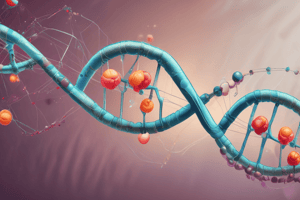Podcast
Questions and Answers
What is the term for the number of chromosomes in a gamete?
What is the term for the number of chromosomes in a gamete?
- Diploid number
- Genome count
- Haploid set number
- Gametic number (correct)
Which type of cell has two haploid sets of chromosomes?
Which type of cell has two haploid sets of chromosomes?
- Gametic cell
- Haploid cell
- Monoploid cell
- Somatic cell (correct)
What determines the shape of chromosomes?
What determines the shape of chromosomes?
- Kinetochore location
- Telomere structure
- Chromonema
- Centromere position (correct)
What is the main role of karyokinesis in the M-phase of the cell cycle?
What is the main role of karyokinesis in the M-phase of the cell cycle?
During which stage does each chromatid of a chromosome get its own centromere?
During which stage does each chromatid of a chromosome get its own centromere?
What happens to the nuclear membrane and nucleolus during the prophase of mitosis?
What happens to the nuclear membrane and nucleolus during the prophase of mitosis?
What is the significance of mitosis cell division?
What is the significance of mitosis cell division?
Which process leads to the division of cytoplasm after karyokinesis?
Which process leads to the division of cytoplasm after karyokinesis?
How does cytokinesis take place in animal cells?
How does cytokinesis take place in animal cells?
During which phase of the cell cycle does the cell prepare for division?
During which phase of the cell cycle does the cell prepare for division?
In which type of cell division is the number of chromosomes in the parent and daughter cells the same?
In which type of cell division is the number of chromosomes in the parent and daughter cells the same?
What is another name for somatic cell division?
What is another name for somatic cell division?
Which stage of the cell cycle is characterized by growth in size and synthesis of RNA and proteins?
Which stage of the cell cycle is characterized by growth in size and synthesis of RNA and proteins?
Flashcards are hidden until you start studying
Study Notes
Chromosome Structure and Cell Division
- The term for the number of chromosomes in a gamete is haploid.
- A diploid cell has two haploid sets of chromosomes.
- The shape of chromosomes is determined by histone proteins that wrap around the DNA molecule.
- Karyokinesis plays a crucial role in the M-phase of the cell cycle, where it separates the chromosomes into two daughter nuclei.
Mitosis and Cytokinesis
- During metaphase, each chromatid of a chromosome gets its own centromere.
- In the prophase of mitosis, the nuclear membrane breaks down, and the nucleolus disappears.
- Mitosis is a type of cell division that ensures the same number of chromosomes in the parent and daughter cells, and it's essential for growth, repair, and replacement of cells.
- Cytokinesis is the process that leads to the division of cytoplasm after karyokinesis.
- In animal cells, cytokinesis takes place through the cleavage of the cytoplasm, resulting in the formation of two daughter cells.
Cell Cycle and Cell Division
- The interphase is the stage of the cell cycle where the cell prepares for division, characterized by growth in size and synthesis of RNA and proteins.
- Mitosis is also known as somatic cell division, where the number of chromosomes in the parent and daughter cells remains the same.
Studying That Suits You
Use AI to generate personalized quizzes and flashcards to suit your learning preferences.




